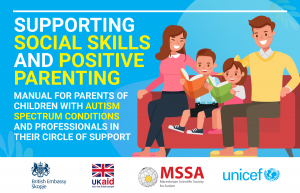PREFACE
Autism spectrum conditions continue intriguing the world as well as the domestic public due to its frequent occurrence, the uncertain mechanisms that prompt the conditions and, moreover, due to the lack of a unique treatment. Difficulties in the sphere of social development and the realization of interaction and communication with the environment are considered to be key vulnerabilities in autism. Difficulties in social functioning are the greatest factor that predicts the diagnosis and the forecast of the respective conditions. In the last decade, research has shown that these early deviations in social development contribute to the overall development of the child and its accommodation in the environment.
Our practical and theoretical experience denies the notion that children with autism are not social or that they have no strive for social interaction and communication. On the contrary, children with autism spectrum conditions often do not have the skills for an everyday social behaviour and these difficulties need to be recognized and implemented in a comprehensive individual program. Given the importance of the social interventions for children with autism, it is imperative for specialists and parents to have access to resources dedicated to social behaviour.
This manual offers you a variety of approaches, practices and evidence-based suggestions for parenting skills for children and youth with autism. However, it is important to point out that due to the heterogenous nature of the autism spectrum conditions, and regarding the parenting skills related to every child, there is no such thing as a unique approach. Therefore, this manual should be treated as a guide, having in mind the variability of success of a specific approach that depends on each child. Nevertheless, the principles described by the authors may be widely utilized and seen as useful for many families with children who have autism spectrum conditions. At the same time, this manual is a valuable tool that will be useful for different profiles of specialists included in the support of children as well as in their daily work. Apart from families, when making of the concept of this manual, we also had in mind the teachers, special educators and rehabilitators, speech therapists, psychologists, pedagogists, medical professionals, nursery caregivers, social workers, personal and education assistants as well as the future professionals, such as the students from the Institute for Special Education and Rehabilitation, and many other vocational profiles that will show their interest in this subject.
The manual “Supporting Social Skills and Positive Parenting” is the first such reading published in our country in three languages: Macedonian, English and Albanian. It covers 7 chapters which fully elaborate the curriculum for education of professionals and parents and the trainings realized in several public institutions of social protection and through a series of virtual workshops and webinars in the period from January to June 2020. The introductory part, which gives the basic characteristics of this pervasive condition, was prepared according to the material created by Prof. Dr. Vladimir Trajkovski, which was used for the needs of the trainings. The second chapter describes the developmental aspects of social skills and social communication and the most common challenges faced by children with autism. In the third chapter are given instructions for assessment of the socio-communication skills and the framework for intervention planning. The fourth chapter explains the evidence- based practices and types of approaches in teaching of this vulnerable category of children. These three chapters are formed according to the material used for the needs of the training and made by Ivana Vasilevska Petrovska, MA. In the fifth chapter, great attention is paid to the methods and tools for child support, including: organizational support, social support, communication support and behavioural support. The fifth chapter was prepared according to the materials made by Ivana Vasilevska Petrovska, MA and Prof. Dr. Vladimir Trajkovski which were used for the needs of the training.
Lately, our understanding of the great influence of sensory sensitivity on the conditions of the spectrum has increased, so this topic has been approached from a practical aspect in the sixth chapter which was prepared by Prof. Dr. Vladimir Trajkovski. Last but not least, the final segment deals with sexual development and sexuality education as inevitably related to the social behaviour of children. The seventh chapter is prepared according to the materials that were used for the needs of the trainings, made by Tanja Stankova, MA.
This manual contains numerous illustrations and examples of practices that will be of immense help to parents and specialists.
We express our gratitude to the reviewers Radmila Stojkovska Aleksova, MA and Irena Lozana for the remarks and valuable suggestions in the favour of bringing this manuscript closer to its esteemed readers. Many thanks to the staff of the UNICEF Office in Skopje and the Government of the United Kingdom for the financial support of this manual.
Skopje, July 2020
Authors
If you are interested you can download the manual for free HERE.

